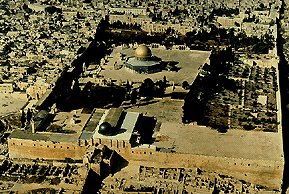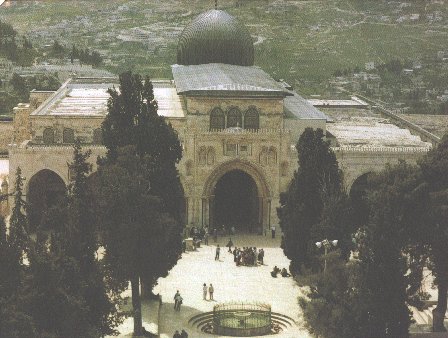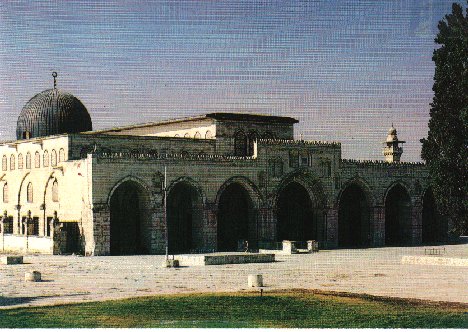
Dome of the Rock & Al-Aqsa Mosque

Palestine is the name given
to a small geographical area between the Mediterranean sea to the West
and the Jordan River to the East. It extends no more than a few hundred
kilometres north to south, from {Lebanon} to the Red Sea respectively.
For centuries it was home to Palestinian Arabs and a very small number
of Jews. Many armies had invaded Palestine durring the millenia that history
can recall, but always the inhabitants remained. The original inhabitants
can trace their origins to Semitic tribes, who travelled from the Arabian
peninsula to Palestine, Egypt, Iraq, Syria and Lebanon at around 3000 BC.
Those remaining in Palestine
became known as the Canaanites. The Ottomans (emanating from present day
Turkey) invaded in the 16th Century and occupied until the British defeated
the Turks towards the end of the First World War in 1917. Britain was given
the League of nations mandate over Palestine and shortly after the mandate
was instigated it issued a declaration stating that it supported the creation
of a "National home for the Jewish people in Palestine. The declaration,
infamously known as the Balfour Declaration was a catastropy for the Palestinians,
because their homeland and birth right were signed away in just a few sentences
which were the culmination of Zionist pressure on Britain and Britain's
own imperialist ambitions.
Encouraged by the declaration,
massive Jewish immigration to Palestine took place between the two world
wars, ceased briefly durring the years of WWII and then resumed, fuelled
by Europian guilt at having allowed the genocide of Jews in Nazi Germany.
As the situation became more
politically unstable, with Palestinians resisting further Jewish immigration,
the British pulled their forces from Palestine and left each side to fight
it out. Similtaneously the newly created United Nations announced a plan
(UN Res. 181, 29 Nov 1947) that would partition Palestine 51% in favour
of the Jewish population. With such huge support from what was effectively
the western allies acting through the UN, Israel declared itself a state
shortly afterwards. Outraged, the Arab Armies of Egypt, Syria and Jordan
rose to defend Palestine but were hoplessly defeated by the well organised
Zionist militias. 1948; The Palestinian tradgedy begins.
For decades after the creation
of Israel there was an almost universal denial of the existence of a Palestinian
people. Golder Mier, a former prime minister of Israel infamously once
said that "There are no Palestinians". The world was subjected to a constant
stream of propaganda claiming that the "promised land" was a barren and
empty place with nothing but a few primitive Bedouin and that the new occupiers
had made the "desert bloom.
Hundreds of Palestinian villages
that supposedly did not exist were razed to the ground. The inhabitants
were either chased into the remainder of Palestine (euphemistically known
as the West Bank) where they lived in refugee camps, or they were hounded
into neighbouring Arab countries where they remain stateless to this day.
In June 1967, fearing that
Palestinians would no longer tolerate being refugees in there own homeland
and also driven by economic and resource (mainly water) crises, Israel
launched a vicious and ruthless attack on the remainder of Palestine in
the West Bank and Gaza. The Six Day War as it came to be known, was a crushing
defeat to the Palestinians and the Arab armies that rallied to defend them.
More refugees were added to the hundreds of thousands that already existed
and Israel moved quickly to ensure that none who fled the boarders with
Jordan and Syria could return. Durring subsequent years much land was expropriated
from Palestinian peasents, sometimes uprooting whole villages to make way
for Israeli settlements. To this day land theft by Israel continues and
the settlements increase, "manned" by extreem right wing jews.
The Palestinians have become
effectively a surf class providing a cheap source of labour and a captive
(sic) market for Israeli goods. Palestinians are forced to pay taxes to
Israel in contravention of international law governing the administration
of occupied land. They are not free to move without identy cards issued
by Israel and even where such movement is allowed it is restricted and
frought with delays and humiliating interogations. Travel to Israel is
srictly forbidden except where a work permit is issued for work with an
Israeli employer.
Lengthy cerfews are imposed
on whole towns, villages and refugee camps for reasons ranging from anti-Israeli
graffiti to stone throwing at Israeli patrols.
Palestinian land is still
being "confiscated" by the Israeli government for Israeli settlements and
many families who once lived in beautifull homes are forced into the refugee
camps.
Durring the Intifada, the
mass Palestinian uprising that started in 1987, tens of thousands of young
palestinians were detained for months without charge under a law entitled
"Administrative Detention" dating back to when Britain had control of Palestine.
Detainees are routinly {tortured} and denied access to family and legal
representatives. Israel is the only country in the world that legitimises
torture. Many Palestinians have died in Israeli jails and thousands remain
detained indefinatly without charge or trial.
The above can only be the
briefest history of the Palestinian struggle against oppression and a more
detailed and comprehensive treatment can be found in the many other web
pages and books written on the subject.

Al-Aqsa
Mosque
The situation now


Al-Aqsa
Mosque